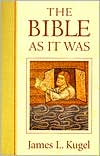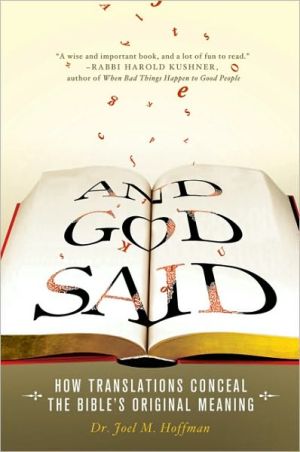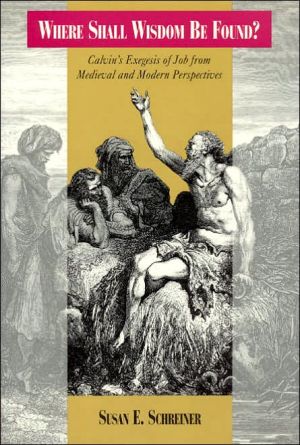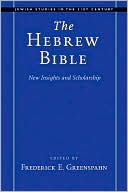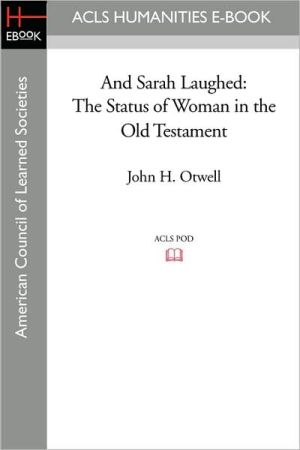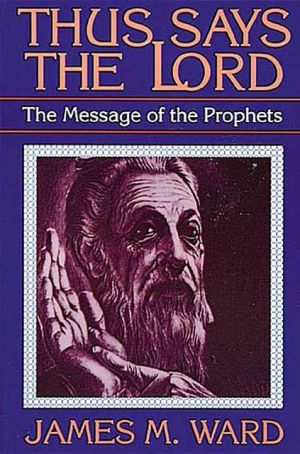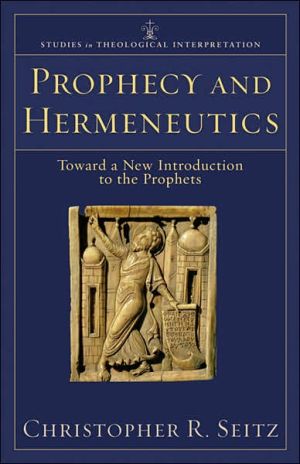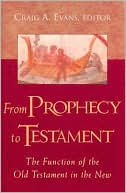The Bible As It Was
This is a guide to the Hebrew Bible unlike any other. Leading us chapter by chapter through its most important stories—from the Creation and the Tree of Knowledge through the Exodus from Egypt and the journey to the Promised Land—James Kugel shows how a group of anonymous, ancient interpreters radically transformed the Bible and made it into the book that has come down to us today.\ Was the snake in the Garden of Eden the devil, or the Garden itself "paradise"? Did Abraham discover...
Search in google:
This is a guide to the Hebrew Bible unlike any other. Leading us chapter by chapter through its most important stories—from the Creation and the Tree of Knowledge through the Exodus from Egypt and the journey to the Promised Land—James Kugel shows how a group of anonymous, ancient interpreters radically transformed the Bible and made it into the book that has come down to us today. Was the snake in the Garden of Eden the devil, or the Garden itself "paradise"? Did Abraham discover monotheism, and was his son Isaac a willing martyr? Not until the ancient interpreters set to work. Poring over every little detail in the Bible's stories, prophecies, and laws, they let their own theological and imaginative inclinations radically transform the Bible's very nature. Their sometimes surprising interpretations soon became the generally accepted meaning. These interpretations, and not the mere words of the text, became the Bible in the time of Jesus and Paul or the rabbis of the Talmud. Drawing on such sources as the Dead Sea Scrolls, ancient Jewish apocrypha, Hellenistic writings, long-lost retellings of Bible stories, and prayers and sermons of the early church and synagogue, Kugel reconstructs the theory and methods of interpretation at the time when the Bible was becoming the bedrock of Judaism and Christianity. Here, for the first time, we can witness all the major transformations of the text and recreate the development of the Bible "As It Was" at the start of the Common era—the Bible as we know it. Steven Schnur - Reform Judaism With humor and insight derived from modern scholarship, archaeology, linguistics, and history, Kugel succeeds as did his ancient interpretive forebears in bringing out 'the universal and enduring messages of biblical texts.
PrefaceThe World of Ancient Biblical InterpretersThe Creation of the WorldWisdom Came First • The "Beginning" Did It • A Special Light • The Angels Were Also Created • God and Someone Else • Completed on FridayAdam and EveDeath in a Day • The Punishment Was Mortality • Sinfulness is Hereditary • The Serpent Was Satan • Blame It on the Woman • An Extra Proviso • The Earthly Paradise • The Garden in HeavenCain and AbelSon of the Devil • Cain's Sisters • Professions Decided • Defective Sacrifices • The Problem Was the Sacrificer • The Good and the Bad • Killed with a Stone • God Knew Where Abel Was • Cain's Sevenfold Punishment • Cain's RepentanceNoah and the FloodCain Was the Worst • The Immortal Enoch • The Heavenly Scribe * Enoch the Sage • Enoch the Penitent • A Bad Match • The Wicked Giants • One Hundred and Twenty until Punishment • Noah Warned of the Flood • Noah the Righteous • Only in His Generation • The Animals Also Sinned • The Purifying FloodThe Tower of BabelThey Tried to Storm Heaven • A War against God • Nimrod Built It • The Builders Were Giants • The Tower Lies in RuinsAbraham Journeys from ChaldeaAbraham the Monotheist • Terah, Priest of Idolatry • Abraham the Astronomer • Tipped Off by the Stars • Abraham Rescued from Chaldea • Abraham Saved from Fire • Abraham Was Upset • Abraham's DreamMelchizedekA Generous Host • Righteous King and Priest • Divinely Appointed High Priest • The Heavenly Melchizedek • The Christian "Order of Melchizedek" • An Uncircumcised Priest? • Melchizedek in Samaria • Melchizedek Was Shem • Services No Longer NeededThe Trials of AbrahamAbraham the Tested • Abraham Saw a Dire Future • Challenged by Angels • God Made It Known • Isaac Was a Willing Victim • Together in Mind • Offering Foreshadowed CrucifixionLot and Lot's WifeLot the Righteous • Lot the Wicked • Sodomites' Sexual Sins • The Proud and the Stingy • Abraham's Hospitality • Lot Learned from Abraham • Lot's Wife Sinned • A Visible Reminder • Lot's Daughters Meant WellJacob and EsauJacob Was Not Just "Simple" • Jacob the Scholar • Esau the Wicked • Good and Evil in Utero • Esau the Warrior • Esau Means Rome • Esau the Deceiver • Esau Didn't Care • Jacob Told the Truth • God Wanted Jacob to be Blessed • The Ladder Was a Message • Angels Wanted to See HimJacob and the AngelJacob Knew Right Away • Deluded in the Dark • Additional Trickery Required • Weak, Bleary Eyes • "Nice Eyes, But..." • God Multiplied Jacob's Flocks • Rachel Was Not a Crook • Jacob Struggled with an Angel • Mighty with God's Help • Israel Means Seeing GodDinahUncontrolled Anger • Shechem Deserved Death • Foreigners Are Different • Intermarriage Is Forbidden • A Wise Answer • The Whole City Was Guilty • City with a Criminal Past • God Said No • God Ordered Their Destruction • Dinah Married JobJoseph's Ups and DownsIt's a Wise Child • Eating from the Flocks • Resembled Jacob in All Things • Deeds of Youthful Foolishness • For the Price of Shoes • Joseph's Great Virtue • A Very Handsome Man • Girls Climbing the Walls • Cast Down Their Jewelry • Joseph Was Not Tempted • Remembered Jacob's Teachings • Saw Jacob's Face • A Collective Accusation • Pharaoh's Servants Applauded • Joseph Had Been DisdainedJacob's Sons in EgyptA Good Reason for Concealing • Joseph Tested His Brothers • Joseph Disdained Revenge • Reuben Lost His Inheritance • Bilhah Bathing • Bilhah Was Asleep • Jacob Foretold the Future • Kingship Will Not Depart Forever • Another King Will Come • Until a New King Comes • A Ruler of the World • Why Did Joseph Put It Off?Growing Up in Pharaoh's CourtA Plan to Finish Them Off • Why Only the Boys? • A Future Savior • Jannes and Jambres • Balaam, Job, and Jethro • Death by Water • Schooled in Every Wisdom • Moses' Speech Defect • Jealous of Moses • Zipporah the Ethopian • Miraculously Burning Bush • The Medium Was the Message • "I Am the One Who Is..." • "I Am the Eternal..." • An Angel in the Hotel • Circumcision Delayed Is Circumcision Denied • A Prenuptial AgreementThe Exodus from EgyptA Godlike Man • No Mere Magician's Trick • Pharaoh Didn't Realize • Divine Punishment of the Egyptians • Deservedly Punished by Water • A Dark Dungeon for Egypt • Metaphorical Darkness • Justifiable Death for the Firstborn • Egyptians Gave Willingly • Fair Wages at Last • The Symbolic Passover Laws • The (Paschal) Lamb of ChristianityThe Red SeaPillar of Luminous Cloud • Protective Covering • An Angel in the Cloud • Final Payment • Get Back Our Goods! • Rebellion at the Sea • More than One Miracle • A Grassy Plain • Miraculous Timing • If Looks Could Kill • Light and Dark Together • Ups and Downs of the Egyptians • Red Sea as Baptism • How Did They Know the Words? • Seeing God at the Sea • Infants Sang Too • Miriam's Separate Song • A New SongInto the WildernessWater, Water... • A Symbolic Tree • The Water Was Divine Wisdom • The Food of the Angels • Heavenly Grain • Adapted to Any Taste • Spiritual Sustenance • The Traveling Rock • Miriam's Well • Amalek Destroyed at the End-Time • The Symbolic Hands of Moses • The Christian Battle with Amalek • Jethro the Polytheist • Jethro the GoodAt Mt. SinaiHeaven on Earth • Celestial Sinai • Heavenly Moses • God Spoke All Ten • God Spoke Only Two • The Ten Were All • The Decalogue Epitomizes • Five and Five • Which Ten Commandments? • No Talk of Weekday Matters • Guard the Sabbath Borders • Do Not Go Out Too Far • Do Not Take Vain Oaths • No False Oaths • Honor Your Heavenly and Earthly Fathers • A Mishap to the Baby • A Mishap to the Mother • Money for an Eye • Traditions of the Elders • Moses Was Given More than the Torah • Oral Teachings from Moses • A Hidden Torah • Moses' Secret Book • A Book before Moses • Children of the Chosen • Singled Out from the Start • Other Nations Knew Anyway • Other Nations at Fault • Remember This BloodThe Golden CalfA Celestial Sanctuary • Copied from Heaven • A Likeness of the Universe • Aaron Tried to Stop Them • Aaron Feared for His Life • Hur Murdered by the Rabble • The Letters Flew Off • Tables Became Too Heavy • Divine Traits of Character • Steadfast Love for Thousands of Generations • No Pardon for the Wicked • Thousands of Sins Forgiven • Moses' Face Beamed Light • Moses Grew HornsWorship in the WildernessAn Error in Priestly Procedure • A Holy Death • Coats Not Burned • Control of Appetites • Ruminating with One's Mind • Gentle Birds for Gentle People • Day of Repentance • The Day of Partial Atonement • Hatred Means Hypocrisy • Reproach Prevents Hatred • Reproach Gently to Prevent Sin • Reproach before Charging • Love As You Would Be Loved • Love Only Your Neighbor • The Whole TorahTrouble along the WayQuails Weren't for Grousing • A Wife Related to Prophecy • Trusted Servant Par Excellence • Whose Bad Idea? • Solemnly Warned • Tassels Set Off Revolt • Moses Accused of Favoritism • Moses Was Polite • Korah's Symbolic Death • A Truly Dangerous Figure • Aaron's Symbolic StaffThe Bronze Serpent, Balaam, and PhinehasLooking Didn't Cure • Serpent Was Like Moses' Hands • Balaam the Wicked • God Knew Who They Were • A Prophet for Hire • Balaam Foresaw the Messiah • A Ruler of the World • The Star Is the Messiah • The Star Will Precede the Scepter • Balaam Counseled Seduction • A Leader among Priests • Phinehas the Immortal • Phinehas Is ElijahThe Life of TorahThe Great Teaching • These Words Twice a Day • A Particular Prophet • Do Not Displace Old Practices • Necessary Paperwork • No Divorce—Except for Indecency • Any Old Reason Is Valid • Don't Muzzle Me • Small Commandments as Important as Big • Torah Refines (Like Fire) • The Gift of the Torah • Not in Heaven Anymore • A Choice for Each Person • A Choice of Two Paths • Nice Road at First • The Path to the Afterlife • Consider Heaven and Earth • Heaven and Earth Were Already Witnesses • Moses Did Not Want to Die • Moses Disputed with an Angel • Moses' Last Vision • Buried by God (or the Angels) • Buried under a Cloud • Not Buried at All • The Supreme PhilosopherAfterwordAbbreviationsTerms and SourcesBibliographyIllustration CreditsIndex
\ New York Times[A] wonderfully rich and learned volume...[Kugel's] purpose in The Bible As It Was is to describe the way the Bible was understood by various ancient peoples, from the Israelites who returned to Palestine after the Babylonian Captivity to the early Christian redactors of the New Testament. Using a staggering number of sources, Mr. Kugel evokes the manner in which the Bible was understood at the time of these interpreters; he also traces the origins of many of the explanations that have remained standard over the millennia. Mr. Kugel's enormous undertaking is likely to be seen as a milestone in the long critical history of Bible studies, that is, of the approach to the Bible as both a human document and a living one, rather than as the immutable and perfect word of God.\ — Richard Bernstein\ \ \ \ \ \ New York Times Book Review[A] fascinating study...[Kugel's] main purpose is to provide a detailed look at how the Torah, the first five books, was interpreted in antiquity, most particularly from the third century B.C. through the first century A.D....To cull material from these diverse sources requires no small expertise as a sleuth and a scholar. Kugel is equal to the task...He tackles his chosen subject with erudition and enthusiasm...Compellingly written.\ — Phyllis Trible\ \ \ \ Times Literary SupplementIt is the general reader whom Kugel has in view throughout, and his aim, in which he admirably succeeds, is both to provide such reader with a first-hand acquaintance with some examples of ancient biblical interpretation and also to show how these make sense, once writers' assumptions and exegetical techniques are grasped...The Bible At It Was is an enjoyable work. It is beautifully produced, clearly set out, so that, in spite of its size, it is easy to use, and is written in a lively, often racy, style; it displays that expository mastery of a complicated subject which is the mark of a distinguished scholar, and it will make the readers to whom it is directed feel at home in an unfamiliar world.\ — J. R. Porter\ \ \ \ \ \ Harvard Divinity Bulletin[This book] takes something you thought you knew and shows you—doesn't just tell you—that you didn't really know it at all...Kugel, who has the wherewithal to be a world-class academic show-off, instead lets the ancients speak in their own voice, make their own case. His learning is staggering, but his scholarly humility is exemplary. You mustn't skip a sentence in his book, and his has so deftly fashioned it that you don't want to.\ — Patrick Henry\ \ \ \ \ \ Cleveland Plain DealerIn this learned yet readable book, James Kugel explains how the earliest scholars tried to make some sense of difficult passages and how their work has forever influenced the way later generations understood the Bible...His book is a good introduction to Jewish biblical tradition and how ancient scribes and scholars understood the Bible.\ — Joseph F. Kelly\ \ \ \ \ \ Commonweal[The Bible As It Was] engages the reader...without demanding knowledge of any ancient languages, and in a prose so sweetly reasonable that daunting scholarship gets spooned out as the delight of discovery...It offers rich resources for the study of comparative scriptural interpretation...[and] not only reminds us of a deeper and broader tradition of biblical study that the profoundly amnesiac version called the historical-critical, but provides a sense of what that older tradition might still offer...[Kugel] shows how the 'legends' developed, not by random imagination, but by means of careful exegetical deduction. Here is the real intellectual thrill, to see how the 'questions' posed by the notorious gaps, indirections, and obscurities of the Hebrew text led naturally...to the sorts of 'answers' gathered together in this volume. Kugel is a talented teacher, who successfully leads his readers through an imaginative reconstruction of the logic at work at every stage from text to traditions...[This anthology] offers valuable resources for a fuller and more organic engagement with Scripture...[It is] brilliantly presented.\ — Luke Timothy Johnson\ \ \ \ \ \ CommentaryThe Bible As It Was guides us deftly through a web that turns out to have been far more extensive and ecumenical than most of us would have thought.\ — Hillel Halkin\ \ \ \ \ \ Reform JudaismWith humor and insight derived from modern scholarship, archaeology, linguistics, and history, Kugel succeeds as did his ancient interpretive forebears in bringing out 'the universal and enduring messages of biblical texts.\ — Steven Schnur\ \ \ \ \ \ Jerusalem ReportA dazzlingly learned and clever study...Kugel's fascinating, eclectic anthology of wisdom is graced by many choice passages from Philo, the 1st-century B.C.E. Jew of Alexandria who excelled in Torah interpretation.\ — Stuart Schoffman\ \ \ \ \ \ Cleveland Jewish NewsBiblical commentaries from 1,500 years ago? How significant could they be to our modern-day perception of biblical stories? Extremely. The picture painted by James L. Kugel... in his recent book, The Bible As It Was, is that it was those interpreters, often anonymous and today largely unknown, who significantly molded our understanding of the Bible...Kugel offers a large, well-selected collection of these interpretations on 23 of the better-known biblical stories. He presents them in a masterful way that makes them easily accessible and enjoyable to the layman...[and places them in]...proper historical and religious context...The Bible As It Was can be read from cover to cover or it can be used as a resource by someone studying a particular biblical incident. The sources in this book are crucial to understanding our Bible, and Kugel has done a great service by making them accessible to the general public.\ — Ari Zivotofsky\ \ \ \ \ \ Library BooknotesThe most important biblical study this decade.\ \ \ \ \ \ New York Times[A] wonderfully rich and learned volume...[Kugel's] purpose in The Bible As It Was is to describe the way the Bible was understood by various ancient peoples, from the Israelites who returned to Palestine after the Babylonian Captivity to the early Christian redactors of the New Testament. Using a staggering number of sources, Mr. Kugel evokes the manner in which the Bible was understood at the time of these interpreters; he also traces the origins of many of the explanations that have remained standard over the millennia. Mr. Kugel's enormous undertaking is likely to be seen as a milestone in the long critical history of Bible studies, that is, of the approach to the Bible as both a human document and a living one, rather than as the immutable and perfect word of God.\ — Richard Bernstein\ \ \ \ \ Commonweal[The Bible As It Was] engages the reader...without demanding knowledge of any ancient languages, and in a prose so sweetly reasonable that daunting scholarship gets spooned out as the delight of discovery...It offers rich resources for the study of comparative scriptural interpretation...[and] not only reminds us of a deeper and broader tradition of biblical study that the profoundly amnesiac version called the historical-critical, but provides a sense of what that older tradition might still offer...[Kugel] shows how the 'legends' developed, not by random imagination, but by means of careful exegetical deduction. Here is the real intellectual thrill, to see how the 'questions' posed by the notorious gaps, indirections, and obscurities of the Hebrew text led naturally...to the sorts of 'answers' gathered together in this volume. Kugel is a talented teacher, who successfully leads his readers through an imaginative reconstruction of the logic at work at every stage from text to traditions...[This anthology] offers valuable resources for a fuller and more organic engagement with Scripture...[It is] brilliantly presented.\ — Luke Timothy Johnson\ \ \ \ \ Cleveland Plain DealerIn this learned yet readable book, James Kugel explains how the earliest scholars tried to make some sense of difficult passages and how their work has forever influenced the way later generations understood the Bible...His book is a good introduction to Jewish biblical tradition and how ancient scribes and scholars understood the Bible.\ — Joseph F. Kelly\ \ \ \ \ New York Times Book Review[A] fascinating study...[Kugel's] main purpose is to provide a detailed look at how the Torah, the first five books, was interpreted in antiquity, most particularly from the third century B.C. through the first century A.D....To cull material from these diverse sources requires no small expertise as a sleuth and a scholar. Kugel is equal to the task...He tackles his chosen subject with erudition and enthusiasm...Compellingly written.\ — Phyllis Trible\ \ \ \ \ CommentaryThe Bible As It Was guides us deftly through a web that turns out to have been far more extensive and ecumenical than most of us would have thought.\ — Hillel Halkin\ \ \ \ \ Times Literary SupplementIt is the general reader whom Kugel has in view throughout, and his aim, in which he admirably succeeds, is both to provide such reader with a first-hand acquaintance with some examples of ancient biblical interpretation and also to show how these make sense, once writers' assumptions and exegetical techniques are grasped...The Bible At It Was is an enjoyable work. It is beautifully produced, clearly set out, so that, in spite of its size, it is easy to use, and is written in a lively, often racy, style; it displays that expository mastery of a complicated subject which is the mark of a distinguished scholar, and it will make the readers to whom it is directed feel at home in an unfamiliar world.\ — J. R. Porter\ \ \ \ \ Jerusalem ReportA dazzlingly learned and clever study...Kugel's fascinating, eclectic anthology of wisdom is graced by many choice passages from Philo, the 1st-century B.C.E. Jew of Alexandria who excelled in Torah interpretation.\ — Stuart Schoffman\ \ \ \ \ Reform JudaismWith humor and insight derived from modern scholarship, archaeology, linguistics, and history, Kugel succeeds as did his ancient interpretive forebears in bringing out 'the universal and enduring messages of biblical texts.\ — Steven Schnur\ \ \ \ \ Cleveland Jewish NewsBiblical commentaries from 1,500 years ago? How significant could they be to our modern-day perception of biblical stories? Extremely. The picture painted by James L. Kugel... in his recent book, The Bible As It Was, is that it was those interpreters, often anonymous and today largely unknown, who significantly molded our understanding of the Bible...Kugel offers a large, well-selected collection of these interpretations on 23 of the better-known biblical stories. He presents them in a masterful way that makes them easily accessible and enjoyable to the layman...[and places them in]...proper historical and religious context...The Bible As It Was can be read from cover to cover or it can be used as a resource by someone studying a particular biblical incident. The sources in this book are crucial to understanding our Bible, and Kugel has done a great service by making them accessible to the general public.\ — Ari Zivotofsky\ \ \ \ \ Library BooknotesThe most important biblical study this decade.\ \ \ \ \ Harvard Divinity Bulletin[This book] takes something you thought you knew and shows you--doesn't just tell you--that you didn't really know it at all...Kugel, who has the wherewithal to be a world-class academic show-off, instead lets the ancients speak in their own voice, make their own case. His learning is staggering, but his scholarly humility is exemplary. You mustn't skip a sentence in his book, and his has so deftly fashioned it that you don't want to.\ — Patrick Henry\ \ \ \ \ Library JournalKugel (Hebrew literature, Harvard Univ. and Bar Ilan Univ., Israel) attempts to reconstruct the Bible as it was understood in the closing centuries B.C.E. and at the very start of the common era. His work is designed to serve as the popular complement to a more scholarly book, soon to be published by Harvard University Press. Here, Kugel aims to show how traditional interpretive motifs regarding the Bible were formed, came to be idealized, and were even regarded as indistinguishable from the biblical text itself, whether by Jews or early Christians. Half of this work is given to elucidating major interpretive motifs drawn from Genesis, the remainder, to major interpretive traditions drawn from Exodus, Leviticus, and Numbers. Kugel has marshaled a great many ancient sources. This important work for intelligent readers should be acquired by all general readership libraries and especially by those intended for theological and sociological research.Robert H. O'Connell, Denver\ \ \ \ \ Frank KermodeJames Kugel has dedicated his new book to a study of the transformation of the Hebrew Bible by midrashic interventions, concentrating on the state of the Bible at a particular period, "roughly speaking, from about 200 BCE through the first century or so CE." He draws his evidence from many sources: the Septuagint (the third century BCE Greek version of the Hebrew Bible, which differs in many respects from the original...); the Dead Sea Scrolls; some apocryphal works like "Jubilees"; the New Testament; the Jewish historian Josephus; and the Targums, or Aramaic versions of Scripture. -- Frank Kermode, The New York Review of Books\ \ \ \ \ Kirkus ReviewsAn extraordinary, pathbreaking scholarly achievement: an annotated anthology of interpretations of ancient (mostly 100 b.c.300 a.d.) interpretations of the Torah (the first five books of the Hebrew Bible) culled from hundreds of sources.\ "Interpretation" here often refers to the homiletical expansion of a biblical narrative—known in the Jewish tradition as midrash—particularly to fill in narrative gaps and vague allusions, or to resolve morally problematic passages. Kugel, a professor of Hebrew literature and the Bible at Harvard and Israel's Bar-Ilan University, notes in a penetrating opening essay that his focus is on "exegetical motifs." He notes basic principles that underlie ancient biblical interpretation, including a view of the Scriptures as "omnisignificant," that is, containing meaning in even the smallest details. Jewish and Christian exegetes also expanded the prosaic to lend greater resonance to seemingly minor matters. For example, Rabbi Simeon Bar Yochai interpreted Deuteronomy 27:17, "Cursed be he who displaces his neighbor's boundary-mark," and Proverbs 22:28, "Do not displace that boundary mark of old set by your father," by adding, "If you see a custom of your forefathers observed, do not reject it." Thus, a law whose literal focus was on property was homiletically expanded to emphasize the "boundary" of religious tradition. Kugel's great achievement is to demonstrate again and again, with hundreds of fascinating examples, how the integrity of the text was both respected and reinterpreted by authors as varied as those of the apocrypha, the earliest midrashim, and the Dead Sea Scrolls, as well as the early Church fathers. His own interpretive comments are consistently clear and engaging.\ This volume, which will be savored by both Jewish and Christian lovers of Scripture, richly illustrates Kugel's point that what we know as "the Bible" is really a series of texts filtered through the imaginative perceptions of its ancient exegetes.\ \ \
